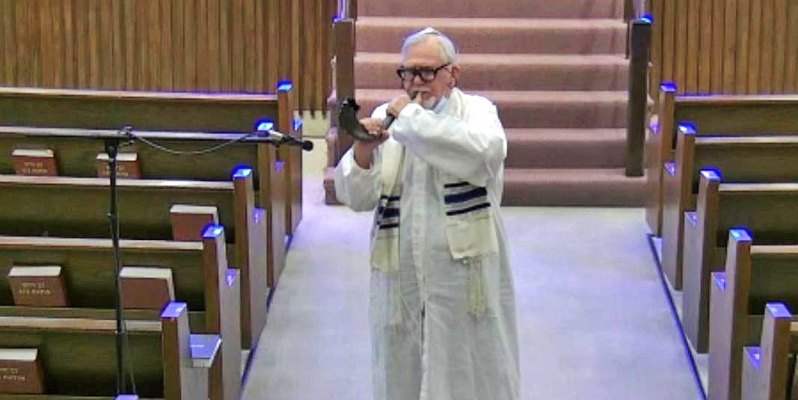A Call and A Calling
My mother's yahrzeit— 26 Elul — fell one year on the Sunday before Rosh Hashanah. There were enough shul members who slept-in on Sundays so that there was a second minyan.
In Elul, the shofar is sounded every morning but Shabbos. I saw that the gentleman leading this "late" service was looking around the room. Then he said, "Can anyone sound the shofar?" Being a one-time trumpet player, I raised my hand and did the job. And someone remembered.
What follows was initially written many years ago.A CALL AND A CALLING
Many of us, through popular, historic and religious literature, are familiar with the term "calling" as it applies to persons of strong religious faith. In our tradition, we are familiar with heavenly calls "placed" to our forefathers, either divinity-to-person or through an angelic intermediary. Perhaps the calling best known to the world at large is the call placed through the burning bush.
There are other calls much more worldly, calls we all receive on a regular basis, tidings of good news not often enough and bad news more often than we'd like. There are calls, as well, when we are asked to do things.
I remember two such calls. The first was to take up the shofar in the midst of Rosh Hashanah services many years ago when the Bal Tekia at Congregation Ezras Israel in Chicago, (the late) Dr. Willie Friedman, became ill on the bimah.
And someone in the main sanctuary remembered…that I could blow the shofar.
I was summoned from the second service — big congregation in those days, three simultaneous services — to rush upstairs and fill in. I sounded the shofar through the rest of the service.
The second call came from (the late) Rabbi Benzion Kaganoff, whom some of you may have known through the years, asking me to assume the honor following the passing of Dr. Friedman, our Bal Tekia.
That call brings me to this reminiscence.
It was my privilege for some 30 years to look out at the Ezras Israel congregation on Rosh Hashanah and at the conclusion of Yom Kippur, standing next to the rabbi, waiting for his instruction. Although I could make out faces only in the first few rows, I had a sense of who was present…and who was not.
- I remember a Zaide who brought his toddler grandson to the front of the congregation to stand right below me, so the boy could see as well as hear what I was about to do.
- I remember the disappointment on the face of a young woman who thought the Tekia Gadola should have been longer.
- I remember the urgings of those who sat near us during Neila on Yom Kippur, light-heartedly asking that I move to the bimah immediately, "sound the bugle," and end the fast.
- And I remember the "Federal Express" daveners of Yom Kippur Ma'ariv,, their concluding Kaddish being my signal.
But before that, after Aleinu, I folded my talis, put it into my own zaide's talis bag, and handed it to Esther to carry out of the sanctuary. Then, I would walk up to the Bimah, take a seat for Ma'ariv and wait. I would reach into the rabbi's lectern where the "little" shofar had resided since Rosh Hashanah, and I would stand, waiting for the rabbi to call, usually in a soft voice for effect, "Tekia Gadola," extending the second word.
As I looked out at the faces, I could see … and remember the faces I no longer there … I would sound the Tekia Gadola in their memory.
In writing this story, I thought back to yet another call, what might have been a final call … but … thank G'd … wasn't. As I sat in the sanctuary, just before Aleinu, one of my neighbors tapped me on the shoulder.
"Can you spare a few minutes after services, before you break the fast?"
He explained. We walked the two blocks to his house, got in his car and made our way to the ICU at Evanston hospital. We were given masks and gowns and ushered into the room of another neighbor, a woman in her early 30s, fighting cancer. My "driver" said it would be a mitzvah for both her and me if she could hear the shofar at the end of the High Holydays. I didn't even take off my mask. I just put the end of the shofar under it and performed the double mitzvah.
Several weeks later, I learned that she was recovering. Did hearing the shofar help her recover? At least mentally?
I must admit that I was honored to perform the mitzvah … and pleased to learn of her return to health.
Bob Manewith might be considered a professional writer. He spent 37 years as a broadcast journalist, writing and producing radio and television newscasts for WGN-AM-TV, Chicago, the largest independent combined news operation in the nation. He later served as News Director of the two stations. When broadcasters were permitted by federal rules to air editorials, he was assigned to state the stations' position, which he did more than 4,000 times. He served as a congressional press secretary and public relations consultant to several county and state elected officials. He also has taught journalism classes as an adjunct at Northwestern University and Columbia College/Chicago.
-----------
See also I Blow the Shofar By Professor Menachem Shapiro https://magazine.esra.org.il/esramagazine/look-into-it/latest-esramagazine/entry/i-blow-the-shofar.html








Comments